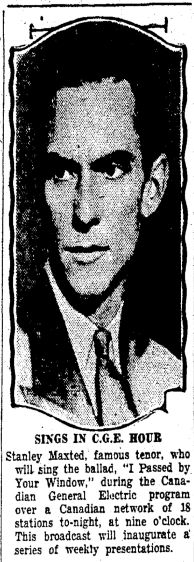Stanley Maxted
Toronto Daily Star, September 8 1931

Stanley Maxted (1895-1963) had five occupations in his life: soldier, steelworker, singer, journalist, and actor. He was born in Britain but was taken into care by Fegan Homes when his parents' marriage collapsed. He was sent to Canada in 1906 as part of the British home children program; fortunately for him, instead of being sent to work as a labourer, he was boarded with a wealthy family in Toronto, earning scholarships in school.
In 1915, he enlisted in the army and was sent overseas, where he was wounded three times, including being gassed twice. He was discharged in 1919 with the rank of lieutenant. Post-war employment was difficult to find, so Maxted went to Pittsburgh to work in the steel industry.
Returning home because of respiratory problems related to the war, Maxted took up singing to strengthen his lungs. He quickly grew prominent, first in Montreal and then in all of Canada, and then signed a contract with CBS in New York in 1930 to sing in five different weekly radio programmes. His health problems forced him to return to Canada later in the 1930s.
During the Second World War, Maxted became a journalist, first in Canada and then in England. He broadcasted popular five-minute talks on the importance of blackout preparations during the London Blitz and then broadcasted one of the first reports on D-Day for the BBC.
After the war, he appeared in and narrated Theirs Is The Glory, a film that re-enacted the battle of Arnhem using destroyed buildings as film sets. This led to a film and stage career that lasted through the 1950s. In later life, he struggled with lung problems, likely related to his war experiences.
Created October 2, 2025.